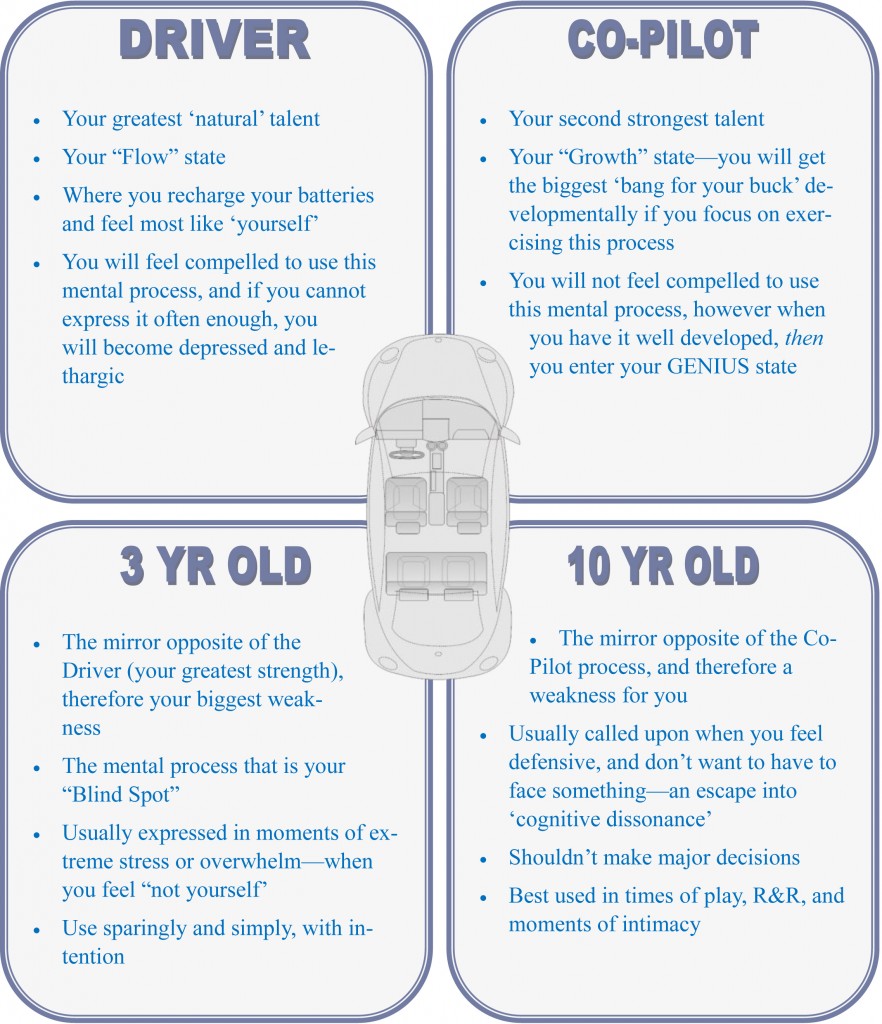Download Episode Here – right click link and select “Save Link As…”
In this episode Joel and Antonia talk about developing a healthy relationship with your tertiary cognitive function (what we call the 10-year-old in the Car Model).
In this podcast you’ll find:
10 year old cognitive function is the one we go to in place of the copilot. Our chief suggestion for growth is to focus on the copilot. We encourage people to stop giving preference to their 10 year old in place of the copilot.
This is not intended as a demonization of the 10 year old. Today we want to show you how accessing your 10 year old in a certain way can accelerate your personal growth.
Rule of Thumb:
- We start developing Driver in teens
- Copilot in 20s-30s
- Tertiary in 30-40s
- Inferior 50s +
It is possible to accelerate this process with focused personal growth.
If you spend enough time exercising your copilot you may be ready to start working on your 10 year old.
What is the loop we are always discouraging people from exercising? The loop is the tendency to stay in the same attitude with which you lead. If you are an introvert you get caught in a loop that favors the introverted world. If you are an extravert you get caught in a loop that favors the extraverted world.
How can we use our 10 year old to be a beneficial tool in our basket?
When we get caught in the loop we are usually doing it because our dominant process is practicing confirmation bias. The 10 year old will usually support the viewpoint of the Driver, and sometimes this is exactly what our driver is looking for.
When we have a good healthy relationship with our 10 year old we find it helps support us because it gives us extra tools that we wouldn’t necessarily have access to.
For example:
-
INTJ – Imagine an INTJ in a relationship where things aren’t going too well. 10 yr old may say, “This relationship is doomed,” because that is what the Driver is already thinking.
- Suggestion: Get into copilot Te* and make pro/con list and create metric around it. What is the dynamic? How are you contributing to this dynamic? 10 year old is telling you that this is completely unfixable, but your copilot may indicate there is a way to save the relationship if you act like an adult and stop asking guidance from a 10 year old.
- Alternatively, Let’s say you are going to your copilot and using the lens of your best and highest self already. How will the 10 year old show up in this case?
- It is still there but it is no longer just a mindless support system.
- For INTJs, the 10 year old is Fi which helps them see how they feel and how others feel. As a support to the copilot, Fi will make and INTJ more sympathetic. It’s about implementing systems that make everyone feel good. Implementing strategies that take everyone into consideration.
- ENTP – 10 year old Fe – This manifests as disconcerting connections. Social anxiety resulting in emotional meltdown. Copilot helps ENTPs get rational without the emotional variable. ENTPs bring clarity by using their copilot Ti. The 10 year old helps them to communicate truths in a way that is more palatable. Delivering a truth that needs to be delivered in a package that doesn’t trigger its listeners.
The 10 year old helps us flush out our messages and gets us in a space where we are more effective at what we are attempting to accomplish.
More Examples:
- ISTP – 10 year old Ni: Ti/Ni loop. ISTPs at their best in Se – copilot. 10 year old needs in the moment experience to be used well by ISTPs. An ISTP might speculate wrongly if he doesn’t start with Se and follow with Ni. Ni can support Se in anticipating what can happen in the moment. Great in law enforcement.
- ESFJ – 10 year old is Ne: in the Fe/Ne loop, ESFJs create patterns that aren’t accurate. Si would look at the precedent and past experience, then 10 year old could form a pattern based upon actual evidence rather than theoretical speculation. Ne becomes more accurate when used in conjunction with Si.
Homework:
- How have you gone to your 10 year old in a defensive way? How has it supported your copilot in a good way? When have things gone right and when have things gone terribly wrong? Post your comments below.
*Abbreviation legend:
- Te – Extraverted Thinking or Effectiveness
- Fi – Introverted Feeling or Authenticity
- Fe – Extraverted Feeling or Harmony
- Ti – Introverted Thinking or Accuracy
- Ni – Introverted iNtuition or Perspectives
- Ne – Extraverted iNtuition or Exploration
- Se – Extraverted Sensing or Sensation
- Si – Introverted Sensing or Memory
To subscribe to the podcast, please use the links below:
Subscribe with iTunes
Non iTunes Link
Download The Android App
Subscribe on Soundcloud
Subscribe with Stitcher
If you like the podcast and want to help us out in return, please leave an honest rating and review on iTunes by clicking here. It will help the show and its ranking in iTunes immensely! We would be eternally grateful!
Want to learn more?
Discover Your Personal Genius
We want to hear from you. Leave your comments below…




Share:
Podcast - Episode 0121 - Love At First Fight With Bruce Muzik
Podcast - Episode 0123 - Self Awareness vs Self Development
20 comments
INFJ here, and the way I think my Terciary cognitive function Ti works to my benefit is this: I’m working on a problem; I’m expressing it. Now I’m hearing data points pop into my mind. I listen to them and fine tune my expression to take in these data points, resulting in a better-reasoned, fact filled argument.
The problem with this example is it doesn’t show me in stress mode. So here is another example of me in stress mode, using Ti to my benefit: I’ve been slighted by a lover; I go into defense mode; pride won’t let me apologize; I string him out for three days. Now I find something to say to him (Fe) that would end the power struggle between us, but I don’t use it. I’m listening further to a deeper message my body is saying to me. It’s telling me I’ve been feeling lost in the relationship recently. I’ve been giving too much of my time to him and not enough time to myself. So I resolve to spend more time on me and my goals, surrounding myself with things I love to do, projects I want to accomplish, rather than focus exclusively on him. So I apologize authentically to him, but delve into the delicious action of doing things that interest me. And it feels good.
This latter situation is tricky, because Defence Mode (our Terciary 10 year old) is a Snake in the Grass. Am I really happier spending more time with myself than him? I decide yes, because I’m happy surrounded by things I love to do, and while I miss him, I no longer feel lost, and most importantly, I’m still feeling an aversion to checking for text messages from him. This could be because I’m hurt, disappointed, and vulnerable and that my perfectionism is still showing. But I think it’s important to pause and look in depth at why I’m still feeling this aversion to him.
Obviously, there’s a lot of scar tissue around this issue for me. So it’s tricky. It’s hard to know when Ti is acting as a benefit or a Sabotage.
I’m INFP and I tend to go to my 10 year old process (Memory) when something in my relationship goes wrong. I tend to think that I have not grown from a previous relationship, and I have a hunch/impending fear that the relationship will end in the same way the previous one did. I tried to use my co-pilot exploration process to respond and act in a different way, it did help me remember using my 10 year old Memory process what exactly happened or has been happening before the relationship went south. In terms of relationships I guess it might be wise to take small exploration steps instead of drastic ones to cut any loss/reduce impact. What do you think?
AWESOME content! Thanks Joel & Antonia!
Thank you for the great post! My body is screaming for some stress reduction with just 3 weeks left of grad school… I shared this
on Facebook in case my friends wanted to see. Thanks!
Hello Joel and Antonia! I’m curious if you could help me here. I’m an ENTJ and I have spent a large amount of time in both my driver and co-pilot process. And have come to make some important decisions based on my conclusions there. My question is what exactly does it mean to develop the tertiary process? What does that look like for somebody who has developed those? Does that mean at some point it would be safe for me to make important decisions based on how things feel for me physically or is that never a good idea? I skateboard a lot and I find that to be extremely enjoyable, i’m not amazing but i’m not bad either. I can see how with some intensive practice I can make something out of this. My concern is whether this could possibly be a delusion based on faulty assesment. Though i’m also not sure if that’s true because I have been spending a lot of time away from work so that I can think of where my actions are taking me. And by no means feel as if skateboarding is an escape from other cognitive functions. Any help would be appreciated, thankyou!